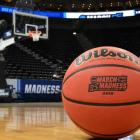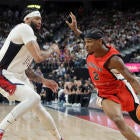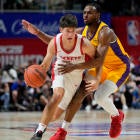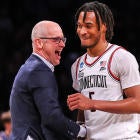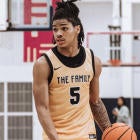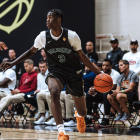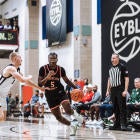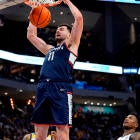The official announcement didn't come until 4:16 p.m. ET Thursday. But, for all intents and purposes, the 2020 NCAA Tournament was effectively canceled roughly 16 hours earlier.
It was over the moment Utah Jazz center Rudy Gobert tested positive for coronavirus.
That's the long and short of it.
Oh, sure, the commissioners of the power leagues continued to ridiculously insist they still planned to play their conference tournaments until they had no sensible choice but to abort -- the Big East embarrassingly later than the others for no good reason. And, sure, the NCAA remained quiet most of Thursday while the sports world around it collapsed. But, all that said, anybody with even a little bit of a brain realized the NCAA Tournament would not be played next week the moment Gobert tested positive for COVID-19.
Within minutes of that report, the NBA suspended its league for at least 30 days.
And that was that.
Here's why: Gobert testing positive meant every player on his team had to be quarantined for 14 days. So the Jazz could no longer play games. And every team that had played against the Jazz in the previous 10 days -- specifically the Cavaliers, Knicks, Celtics, Pistons and Raptors -- were also asked to self-quarantine. So, suddenly, six of the NBA's 30 franchises had teams unavailable to play.
Shutting down was the only option.
Now let's translate that to the NCAA Tournament.
Officials with the World Health Organization made it clear Wednesday morning that this pandemic will get worse before it gets better. And it's already bad. So, let's be honest, it was inconceivable to think no players on NCAA Tournament teams would eventually test positive for coronavirus.
The NBA has 30 teams.
The NCAA Tournament has 68.
So there is no sensible way to trick yourself into thinking the NCAA could hold a 68-team tournament over a three-week span, during a time when a pandemic is getting worse, not better, without having at least one player or coach or manager or anybody fall ill with coronavirus. It was going to happen, at some point. And, when it happened, that was game-set-match for the NCAA Tournament. It could've been a Kentucky coach or a Northern Kentucky player. Doesn't matter. Soon as somebody tested positive, the entire team would be quarantined -- and any teams in recent contact with said team would also be quarantined. And you simply cannot conduct a tournament properly when a team still in the bracket is quarantined.
Again, that's the long and short of it.
And it sucks. It absolutely sucks -- for everybody, obviously, but especially for the seniors who will never play another college game, like Michigan State's Cassius Winston, Seton Hall's Myles Powell, Marquette's Markus Howard and Hofstra's Eli Pemberton. And it also sucks for the schools that were uniquely positioned to make a real run at a national title in ways that fly in the face of history, like Anthony Grant's Dayton Flyers, Scott Drew's Baylor Bears, Brian Dutcher's San Diego State Aztecs and Mark Pope's BYU Cougars. All of those teams and players -- and fans of those teams and players -- lost something they'll never get back. So this will forever be an all-time what-if for everybody involved. It stinks. But, undeniably, what's happening now is more important than basketball. So I credit the NCAA for doing the difficult, but appropriate, thing. And, more than anything, I hope it helps our country avoid a worst-case scenario.
That should be the goal.
As for what's next, who knows? But the title game of the next NCAA Tournament is scheduled for April 5, 2021, at Lucas Oil Stadium in Indianapolis. Everything I've read suggests we'll be fine by then. And on Thursday, if nothing else, NCAA officials showed they're committed to doing their part to help.
I applaud them.
It's a strange and sad way to end a season.
But, still, they should be applauded for doing what's right.








